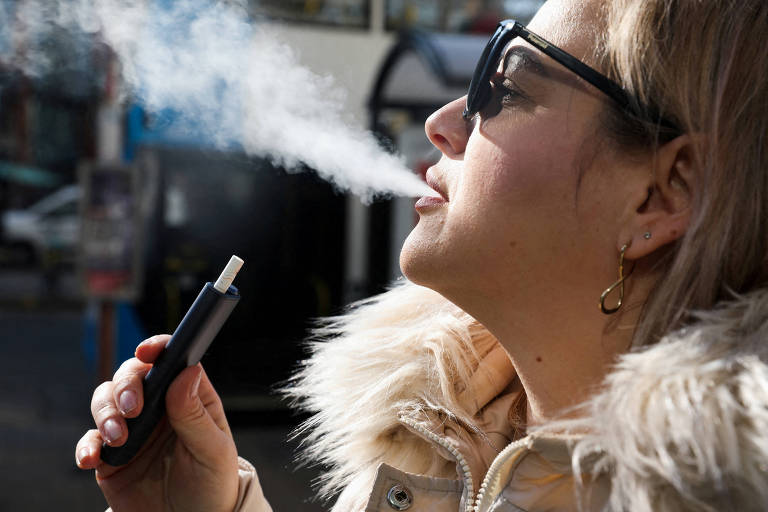Brazil is one of the 4 countries in the world that have made the most progress in tobacco control, says WHO

Only four countries in the world, including Brazil, have managed to adopt a set of measures recommended by the WHO (World Health Organization) since 2007 to reduce smoking, according to a report by the organization released this Monday (23) during the World Conference on Tobacco Control, in Dublin (Ireland).
The document assesses the results of six measures (mpower) launched 18 years ago, warns that the tobacco industry is "aggressively targeting" young people to increase sales of e-cigarettes and calls on governments to resist such interference in their tobacco control policies.
In addition to Brazil, Turkey, the Netherlands and Mauritius (Africa) have adopted the full package of measures recommended by the WHO. These include: monitoring tobacco use and prevention policies; legislation on smoke-free environments; help to quit smoking; warnings about the dangers of tobacco on packaging labels and in the mass media; bans on tobacco advertising, promotion and sponsorship; and increased tobacco taxes.

According to the WHO, in 18 years, the number of countries that have implemented at least one of these policies has increased from 44 to 155. In terms of population impact, this means 6.1 billion people have been served, compared to 1 billion in 2007. At the same time, 40 countries have not adopted any of these measures.
“We have many successes to celebrate, but the tobacco industry continues to evolve and so must we,” said Tedros Adhanom Ghebreyesus, WHO Director-General, at the opening of the event on Monday.
"By bringing together science, policy and political will, we can create a world where tobacco no longer claims lives, damages economies or steals futures. Together, we can end the tobacco epidemic."
The report points out that the greatest progress has been made in relation to labeling with warnings about the health risks of tobacco: 110 countries have adopted this, compared to just 9 in 2007.
But the WHO warns that enforcement has been inconsistent, there is a lack of educational campaigns, smokeless tobacco packaging remains poorly regulated and only a third of the world's population now lives in countries that have created smoke-free environments.
There are other major bottlenecks. At least 134 countries have failed to make cigarettes less affordable by raising taxes. The WHO recommends a 75% tax.
The document also draws attention to the spread of e-cigarettes and heated tobacco products, which has led many young people to consume them. Today, 133 countries regulate or ban electronic smoking devices (ESDs), compared to 122 in 2022 — and 62 still do nothing.
The extent of regulation varies from nearly 90% in the richest countries, 66% in middle-income countries and just 27% in poor countries.
According to the WHO, countries should consider extending the warnings currently contained on traditional cigarette packs to vapes, heated tobacco products and nicotine pouches.
"We urge governments to act boldly [to implement the six recommended measures]. We know what works. We have seen it work. We need to close the gaps because 1.3 million people still die each year from second-hand smoke, and millions more from tobacco use," said Ruediger Krech, WHO's director of health promotion.
When asked about what would be the best solution for countries, regulation or prohibition, taking into account the scenario in Brazil, which currently prohibits the sale of electronic cigarettes through a resolution by Anvisa (National Health Surveillance Agency), but sees their use growing, especially among younger people, Krech responded that it depends on the country's context.
"It's hard for us to say that prohibition is always the best solution. We can't say that. What we're saying is that if you're not prohibiting, you need to regulate it very heavily."
He acknowledges, however, that even countries with good regulations are finding it difficult to deal with the "onslaught of thousands" of new products launched by tobacco companies.
"It is extremely important to regulate these new products, because they are attracting children and young people to use nicotine, leading them to addiction."
Also on Monday, Bloomberg Philanthropies, a WHO partner in anti-tobacco actions, recognized, through an award, governments and NGOs in six countries for their efforts to combat tobacco use.
India, Mauritius, Mexico, Montenegro, the Philippines and Ukraine were awarded prizes. Government and non-governmental organizations from India, Mauritius, Mexico, Montenegro, the Philippines and Ukraine were also awarded prizes.
India, for example, has prioritized smoking cessation approaches with a national toll-free quitline answering about 50,000 calls per month and free cessation support and services available in hospitals and primary care facilities. Mexico has passed a law banning 100% advertising, promotion and sponsorship of tobacco products.
Montenegro also increased taxes on cigarettes between 2017 and 2024. The excise tax on cigarettes increased by 73%, and the average price of a cigarette rose by 24%. According to the latest available data, the prevalence of tobacco use in Montenegro decreased by almost 7% between 2019 and 2022.
“The global tobacco control movement has helped save tens of millions of lives, making it one of the most successfulpublic health efforts in history,” said Michael R. Bloomberg, founder of the organizations that bear his name, WHO Global Ambassador for Noncommunicable Diseases and former Mayor of New York City.
At the awards ceremony, Bloomberg also announced a new $20 million accelerator fund to help advance progress in countries where tobacco control has stalled.
The reporter traveled at the invitation of Vital Strategies.
uol





